
15 minute read
Lesson 1 Sports from A to Z
SPORTS FROM A TO Z
VOCABULARY
1 Look at the different sports.
Match the pictures with the words on page 93.
1 2 3
4
7 5
8 6
9
92
10 11 12
wrestling climbing fi gure skating bobsleigh ice-hockey judo golf water polo snowboarding skateboarding
Lesson 1
handball fencing
2 Name sports in each group below without looking back at the previous page.
winter sports / water sports / team sports / outdoor sports / sports that are played with the ball / indoor sports
3 Group up the sports into 3 columns.
Mind1 the verbs you use with each sport.
rugby, cricket, soccer, rowing, cycling, basketball, tennis, boxing, karate, volleyball, skiing, judo, horse riding, sailing, swimming, high jump, running, gymnastics, athletics, wrestling
PlAY gO dO
READING
1 Answer the questions.
How often do the Olympic Games take place?
Who can take part in the Olympic Games?
What is the motto2 of the Olympic Games?
2 Read the fi rst paragraph of the text on page 94 and check your answers.
1to mind [maind] — бути уважним, пам’ятати 2a motto [9mAtCU] — девіз
93
3 Read the rest of the text and fi nd the correct headings for each paragraph. for each paragraph.
THE OLYMPIC FLAG MEDALS
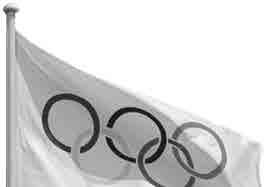
THE PARALYMPIC GAMES
THE WINTER OLYMPICS


The Olympic Games are a modern international sports event. The best sportsmen from many countries all over the world compete in different sports. The games take place every four years in a different country. All sportsmen are proud to represent their country. The motto of the Olympic Games is: SWIFTER, HIGHER, STRONGER.


The Olympic Games are a modern international sports event. The best sportsmen from many countries all over the world compete in different sports. The games take place every four years in a This is one of the symbols of the This is one of the symbols of the games. It has a white background with fi ve interlocking rings: blue, yellow, black, green and red. Why these six colours? Because they appear on all the national fl ags of the world. The fi ve rings represent the fi ve inhabited continents of the world: America, Europe, Asia, Africa and Oceania.




94
THE OLYMPIC MASCOT
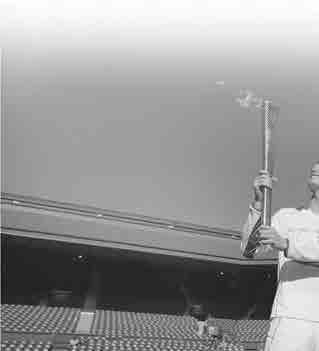
THE OLYMPIC FLAME
THE SUMMER OLYMPICS

Lesson 1
This is a character that represents the country where the Olympic Games are taking place but also the Olympic spirit. It is usually an animal: a tiger (Seoul, 1988), a dog (Barcelona, 1992) an eagle (Los Angeles, 1984). But it can also be a creature: Fuwa (Beijing, 2008), Wenlock and Mandeville (London, 2012).
The best athletes in each sports event get medals: gold for the fi rst place, silver for the second place and bronze for the third place. However, the most important thing about the games is not to win, but to take part.
This tradition comes from a long time ago — from ancient Greece. Months before each games, a torch is lit at Olympia in Greece and sportsmen carry it across the world to the city where the new Olympic Games take place. The fl ame travels through many countries and it remains lit until the last day of the games. During the closing ceremony, it is put out.

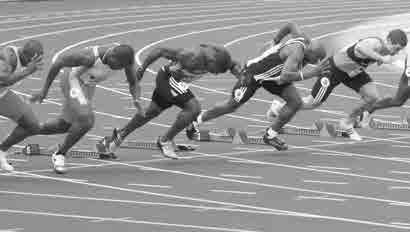
95

During the two to three summer weeks, athletes compete in more than 30 sports disciplines: gymnastics, athletics, rowing, sailing, badminton, wrestling and many others. The modern Summer Olympics started in 1896.


Figure skating, ice hockey, skiing, snowboarding and bobsleigh are some of the ice and snow sports that you can see during the games. There aren’t so many sports as during the Summer Olympics, but they are also interesting. The fi rst Winter Games were organised in France in 1924. The Paralympic Games are the games for athletes with a disability1. They are held every four years in the same year as the Olympic Games. They are parallel to the Olympic Games and that is where their name comes from. Thousands of athletes from many countries compete in the events such as: wheelchair basketball, cycling, swimming, track and fi eld events, wheelchair tennis and many other events.

96
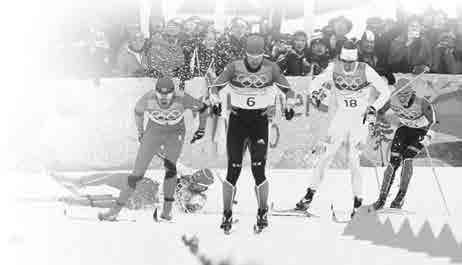
1disability [0disC9biliti] — неповносправність, фізичні вади
Lesson 1
4 Correct the sentences below.
1 The Olympic Games take place every fi ve years. 2 There are six colours on the Olympic fl ag: white, pink, yellow, brown, grey and red. 3 The Olympic mascot is a building that represents the country where the games take place. 4 The Summer Olympics last for 2 to 3 months. 5 The most important thing about the games is to win.
VocabuLaRy box
a fl ame [fleim] a mascot [9m2skCt] a spirit [9spirit] a wheelchair [9wI:ltSeC] to compete [9kAmpitC] to light [lait] to represent [0repri9xent] zzto take place zzto take part zzacross the world
6 The Winter Olympics are older than the Summer Olympics. 7 The Olympic fl ame is lit during the opening ceremony. 8 The Paralympic Games are the games for senior athletes.
5 Work in pairs. Take turns and speak about everything you remember about the Olympic Games.
6 Work in groups. Make a Sports ABC.
1 Think of a sport for every letter of the alphabet. 2 Do some research work in groups. 3 Design your poster. 4 Present your poster to your classmates.
The group with the longer list is the winner!
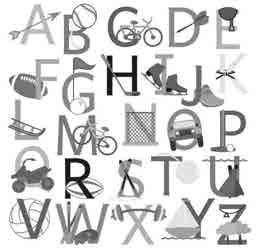
97
GRAMMAR
1 Read and compare short questions at the end of thesentences in both columns.
zzI am 14, aren’t I?
zzWe are waiting for you, aren’t we? zzHe has been here before, hasn’t he? zzYou were watching a fi lm, weren’t you? zzShe has left, hasn’t she? zzYou can swim, can’t you? zzWe will go, won’t we?
zzYou like Coke, don’t you? zzWe passed the test, didn’t we? zzThis car isn’t expensive, is it? zzThey are not selling it, are they? zzIt wasn’t here yesterday, was it? zzWe were not thinking about it, were we? zzThey haven’t given us a price, have they? zzYou can’t afford anything, can you? zzThey won’t stay here, will they?
zzWe don’t live alone, do we? zzI didn’t say this, did I?
98 RemembeR!
A question tag is a short question at the end of a statement1 . The verb that we use in the tag depends on2 the verb in the statement. Positive statements have negative question tags.
The boys like the bikes, don’t they? Negative statements have positive tags.
They don’t really need the bikes, do they?
Read p. 211
(Розділові питання)
1a statement [9steitment] — твердження 2to depend (on) [di9pend] — залежати (від)
Lesson 1
2 Write the negative form that you would use in a question tag.
1 ARE _________ 2 CAN _________ 3 SHOULD _________ 4 WERE _________ 5 DID _________ 6 DOES _________ 7 WILL _________ 8 HAS _________ 9 DO _________ 10 WOULD _________ 11 IS _________ 12 WAS _________
3 Complete with the question tags.
A: You are from Great Britain, ...?
B: Yes, I am.
A: You have just arrived in the USA, ...?
B: No, I arrived three months ago.
A: The weather is better here, ...?
B: Yes, much better.
A: You have a lot of rain in Great Britain, ...?
B: Oh, yes.
A: Our school system interests you, ...?
B: Yes, it does. It’s different from ours.
A: You visited my school yesterday, ...?
B: Yes I did.
4 Complete with the correct question tags.
1 Apples aren’t expensive, ... 2 We won’t buy any fruit today, ... 3 Paris isn’t the capital of Portugal, ... 4 You wouldn’t like to be a dentist, ... 5 The Smiths don’t travel much, ... 6 Your parents haven’t been abroad, ... 7 Little Billy doesn’t go to school yet, ... 8 Teachers shouldn’t be too strict, ... 9 You didn’t arrive on time, ... 10 Our neighbours can’t drive, ...
99
5 a) Make positive statements with negative question tags using the verbs in brackets.
1 Paul ... a cat, ...? (have got) 2 Jerry and Tim ... football, ...? (like) 3 Mary is crazy about swimming. She ... swimming every week, ...? (go) 4 I came home at four. You ... here at four too, ...? (be) 5 Pandora was busy last weekend. She ... her room all weekend, ...? (paint)
b) Make negative statements with positive question tags using the verbs in brackets.
1 You ... that fi lm yesterday, ...? (see) 2 Most people here ... English, ...? (speak) 3 Henry ... good marks, ... ? (have got) 4 We ... out tomorrow, ...? (go) 5 There ... a shop in this street, ...? (be)
LISTENING
1 Copy the form. Тhen listen to the dialogue and complete it.
RICHMONDS SPORTS CLUB
APPLICATION FORM

100
Date ____________ Surname: _________________ First name _________________ Address ________________________________________________________ Address ________________________________________________________ Date of birth ______________________ Sex: male / female (circle) Date of birth ______________________ Sex: male / female (circle) Sports _________________________________________________________ Sports _________________________________________________________ Previous experience ___________________________________________ Previous experience ___________________________________________ Competitions / teams _________________________________________ Competitions / teams _________________________________________ Do you want coaching sessions? (specify) ____________________ Do you want coaching sessions? (specify) ____________________


VocabuLaRy box
champ [tS2mp] = champion competition [0kAmpC9tiSn] freestyle [9frI:stail] membership [9membCSip] fabulous [9f2bjUlCs] junior [9dzu:niC] zztraining session
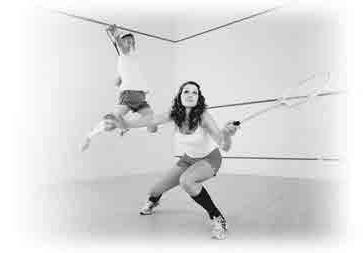
Lesson 1
squash [skwAS]
2 Listen again and match each sentence with the correct question tag from the box.
1 Your full name is Naima
Abawickrama , .....? 2 You don’t live in Richmonds Club, ....? 3 You aren’t sixteen yet, .....? 4 You want to play squash, ......? 5 You were in your school swimming team last year, .....? 6 You won the school 100 m freestyle race, .....? 7 You’ve never played squash before, .....?
Question tags
a are you? b didn’t you? c isn’t it? d do you? e have you? f don’t you? g weren’t you?
3 Work in pairs. Imagine you are applying1 to a sports club. Copy the application form from task 1 again and complete it for yourself. Give the form to your partner.
He / she will check it like this:
A: Your name is ....., isn’t it? B: Yes, it is.
1to apply [C9plai] — звертатись з проханням, подавати заяву
101
4 Guess what these words mean. Check their meanings with your friend, your teacher or the vocabulary at the end of the book.
5 a) Before listening say what you know about water polo and its popularity around the world.
a visiting team an attacker a defender a whistle a goal a penalty a referee a goalkeeper a home team a foul to score to cheer
b) Read, listen and complete the rules.
Adrian and Celia are preparing to watch a water polo match.
Celia doesn’t know anything about this sport, so Adrian is explaining the rules.
WaTeR poLo RuLeS
1 Number of players in each team: ... 2 The game has ... parts 3 Each part lasts ... minutes 4 Size of the pool: ... metres long, ... metres wide 5 Colour of the ball: ... 6 After a foul the referee can send out the player for ... seconds 7 After a bad foul there can be a penalty shot from ... metres
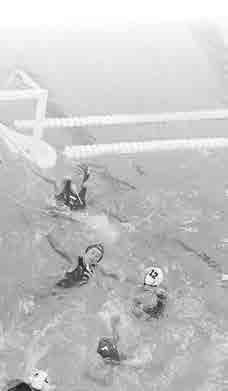
102
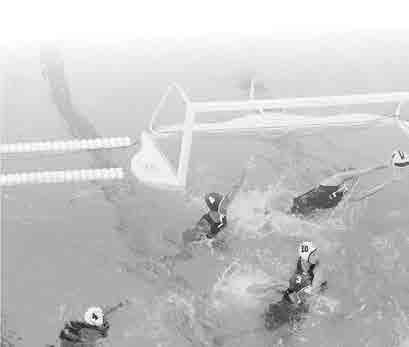
Lesson 1
RemembeR!
MEASUREMENTS AND TIME 100 centimetres = 1 metre 1000 metres = 1 kilometre 60 seconds = 1 minute 60 minutes = 1 hour The pool is 20 metres long and 10 metres wide. Each part is 5 minutes long. It lasts 5 minutes.
6 Listen, then read what Celia and Adrian are talking about while they are watching the match. Try to understand what is going on, then complete the sentences.
1 Brian’s team, the home team, are wearing ... caps. 2 Brian is a ... player. 3 The referee is blowing the whistle for the ... of the game. 4 ... is shooting a penalty from fi ve metres. 5 At the end of the match the score is ... .
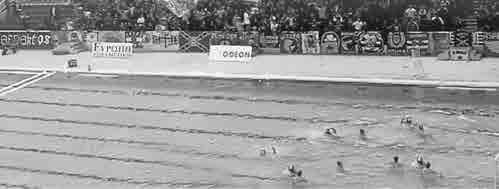

Celia: Why are Brian’s team wearing dark caps? Adrian: Because these are the rules. The home team always wear dark caps. The visiting team wear white caps. Celia: What do you think? Is Brian a good player? Adrian: He’s brilliant. He’s the best. (whistle)
103
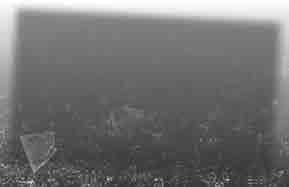
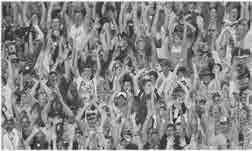
Celia: Why is the referee blowing the whistle? Adrian: The referee always blows the whistle at the beginning. Celia: Look at Brian! What is he doing? Adrian: He’s trying to get the ball for his team. Adrian and Celia: Go, Brian, go!!! You’ve got it!!! Adrian: The score is 2-2! It’s still a draw and it’s nearly the end of the game. Celia: Cheer up! Brian’s team have the ball. Cheer up! Brian’s team have the ball. Adrian: Oh, no! That’s a foul!! (whistle) Celia: What is Brian doing? Adrian: He’s getting ready to take the penalty. Celia: Why is Brian taking the penalty? Adrian: After a bad foul the other team gets a penalty from fi ve metres. And stop asking so many questions and watch the match! You’re making me nervous. Adrian and Celia: GOAL!! Way to go Brian! 3-2! We’ve won!
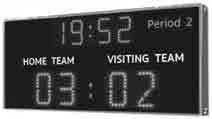
RemembeR!
SPORTS SCORES The score is 4-3. Read: four three Manchester beat Leeds 4-0. Read: four nil The score is 2-2. Read: it’s two all, it’s a draw. She won the fi rst set 6-0. (tennis) Read: six love
7 a) Answer the questions.
1 Are Adrian and Celia watching a handball match? 2 Are they cheering? 3 Is Brian playing well? 4 Why is the referee blowing the whistle? 5 Who is shooting the penalty? 6 Why is Celia asking a lot of questions?
104
Lesson 1
b) Say if the sentences are true or false.
1 I watch TV every Sunday afternoon. 2 “What are you doing?” “I’m reading.” 3 Celia always asks too many questions. 4 Brian plays water polo every day. 5 James sometimes bites Brian’s fi nger. 6 Look! Brian is daydreaming again!
SPEAKING
1 Work in pairs. Ask and answer the questions.
zzDo you do any sports? zzWhich sport can you do at school? zzDo you like watching sports? zzWould you like to try playing water polo? zzWhich are the most popular sports in Ukraine? zzWhat is your favourite sportsman or team?
2 Read and complete the fact fi le on page 106 in your copybook.
Then answer the questions below.
1 Michael Schumacher, or Schumi, is a very famous racing car driver. He’s got lots of fans around the world. MICHAEL SCHUMACHER 1 Michael Schumacher, or Schumi, is a very famous racing car driver. He’s got lots of fans around the world. 2 Michael comes from Germany.
He was born on the 3rd of
January, 1969. He is rather tall and thin with short dark hair.
Michael can drive very fast cars. He can also play football and tennis very well.
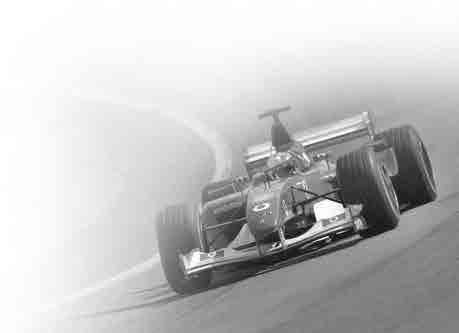
105
3 Michael is Ferrari’s best Formula 1 driver. “I’ll do everything I can to bring the Number One to Ferrari”, he says. “The whole team and the fans deserve it.”
Which paragraph Full Name: ........................................ Occupation: ........................................ Team: ........................................ Born: ........................................ Personal details: ........................................ ........................................ Michael Schumacher includes: zzthe personal details and hobbies? zzwhat he is famous for? zzthe company he works for and his quote1?

3 Look at the fact fi le below and present Kimi Raikkonen to the class.
106
Name: Kimi surname: Raikkonen Nickname: Iceman Occupation: Racing car driver Nationality: Finnish Born: 17th October, 1979 Personal details: short blond hair Hobbies: snowboarding, jogging, ice-hockey snowboarding, jogging, ice-hockey Current Team: McLaren MercedesCurrent Team: McLaren Mercedes
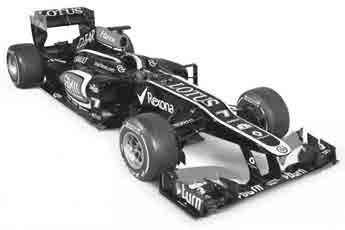

1a quote [kwCUt] — цитата
WRITING Lesson 1
1 Write an e-mail to your friend describing a recent sport event you watched. Use the questions and the example below.
zzWhere and when did it take place? zzDid you watch it at the stadium or on TV? zzWho did you go there with? zzWhat sort of match or game was it? zzWho won? zzDid you enjoy it?
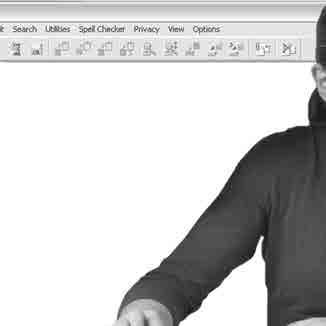
Hi …! There was a … … … competition (game, match) on (in, at) … … … yesterday. I saw it with … … … The competitors showed … … … The spectators were … … … The score was … … … I think the competition (game, match) … . …
2 Write a paragraph about your favourite sportsman / woman.
zzWhat sport does he/she do? zzMake a list of his/her achievements. zzWhat traits of character does he/she have? zzWhy do you like him/her?










